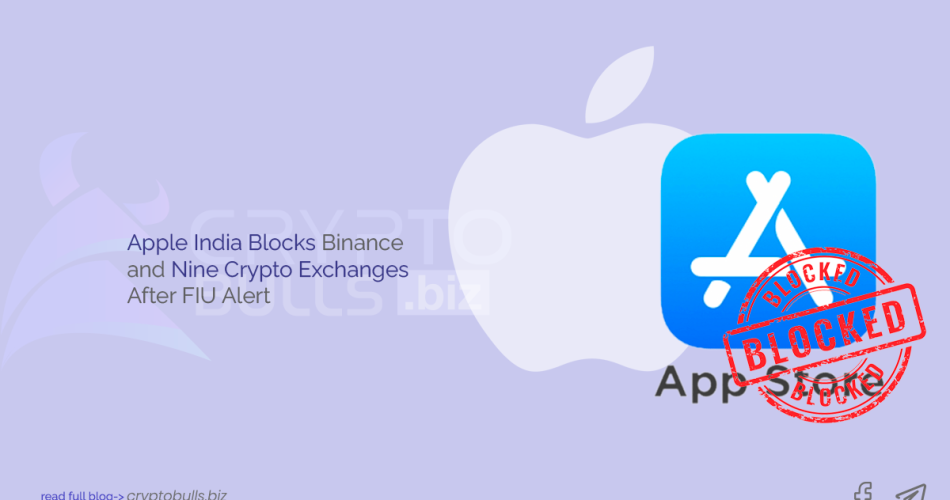The Big Freeze: Apple India Blocks Binance and Nine Crypto Exchanges After FIU Alert
India’s regulatory crackdown on cryptocurrencies has grown more severe, resulting in increased scrutiny for international exchanges. The mobile apps for several significant cryptocurrency exchanges, including Binance, KuCoin, Bitget, Huobi, OKX, Gate.io, and MEXC cryptocurrency exchange, were recently removed from Apple’s App Store in India. This action comes after a slew of initiatives by the Indian government to promote the use of domestic cryptocurrency exchanges and address issues with tax evasion and noncompliance with anti-money laundering regulations.
India’s Regulatory Background
Nine cryptocurrency exchanges, including Binance, Huobi, Kraken,Gate.io, Bittrex, Bitfinex, and others, received show cause notices from India’s Financial Intelligence Unit (FIU), a government agency in charge of monitoring financial transactions because they had violated the nation’s anti-money laundering laws. The FIU stressed that exchanges providing services to users in India must register with the income tax department as “reporting entities” and submit statements. The government wants to ensure that offshore and Indian exchanges operate on an even playing field by upholding KYC, PMLA, and tax laws.
Following India’s implementation of a 30% tax on cryptocurrency gains and a 1% deduction on each cryptocurrency transaction, regulatory actions have been taken. Due to these tax regulations, trading volume on exchanges based in India significantly decreased, which encouraged many Indian traders to move to international cryptocurrency platforms in an attempt to avoid paying taxes. These recent regulatory actions demonstrate the Indian government’s focus on lowering the use of cryptocurrency for illicit purposes and promoting the use of compliant exchanges.
Apple App Store’s Removal Action
The government’s commitment to implement regulatory measures is demonstrated by the removal of cryptocurrency exchange apps from India’s Apple App Store. Some of the exchanges whose apps are no longer available to new users in India through the App Store are Binance, KuCoin, Huobi, Kraken, and others. By limiting access to offshore exchanges that are judged non-compliant, the action seeks to improve domestic cryptocurrency trading regulations.
The Indian crypto community is actively debating the reasons and cautions behind the removal of these apps from Apple’s ecosystem on social media. App Store searches on Mexc, Huobi, and Gate.io are not resulting in the expected results, in addition to Binance and Kraken.

Although these apps are no longer available in the Apple App Store, they can still be found on Google Play Store, and their websites are still reachable in India. The government is still working to block URLs linked to exchanges that do not comply, and it is keeping a careful eye on how accessible these platforms are through alternative channels.
Effects on Crypto Exchanges in India
Indian cryptocurrency exchanges have always placed a strong emphasis on following local laws, which include strict know-your-customer procedures. Examples of these exchanges are CoinSwitch Kuber, CoinDCX, and WazirX. The goal of the latest regulatory actions is to reduce the disadvantage Indian exchanges have in the marketplace as a result of traders choosing to use offshore services that are not in compliance. CoinDCX has revealed plans to compensate users who move their cryptocurrency holdings from international exchanges to its India-based platform in an effort to buck this trend.
In conclusion, the government of India is committed to encouraging compliance, lowering tax evasion, and promoting the use of native exchanges, as evidenced by the regulatory tightening on cryptocurrency exchanges, which is seen in the removal of apps from Apple’s App Store. The way these regulatory actions curb non-compliance and change traders’ behaviour in the ever-changing regulatory landscape will determine how they affect the cryptocurrency landscape in India. India’s position will likely influence the legal challenges facing the cryptocurrency industry worldwide and how quickly cryptocurrency adoption develops there.


